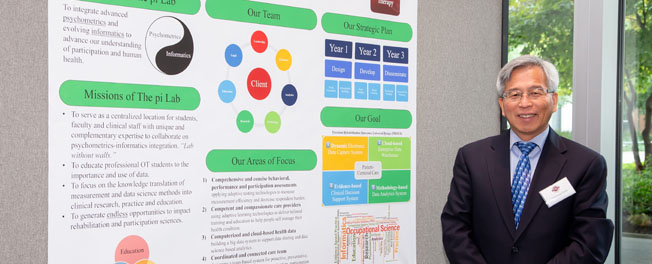Psychometrics+Informatics Laboratory

General Laboratory Description
Dr. Chang directs the Psychometrics+Informatics Laboratory (pi Lab), which aims to integrate modern psychometrics and evolving informatics to advance human ability and health. The pi Lab is envisioned to develop, design, deploy and disseminate methodological and technological innovations for clinical research, education and practice.
The pi Lab is guided by the team science principle to serve as a centralized location for students, clinical staff and faculty with unique and complementary expertise to learn and share. Its multidisciplinary approach brings researchers, educators and clinicians together to collectively solve significant issues in biomedical and public health.
The pi Lab specifically focuses on the knowledge translation of measurement theory and data science methods and on the design, development, deployment and dissemination of universally designed data capture, analysis, report and visualization systems to improve our understanding of participation and the impact that being actively engaged in family, work and community participation has on health.
General Description of Student Activities
Students will have the opportunity to participate in lab activities such as literature/scoping reviews, assessment tool design, data collection and analysis, presenting results, writing journal articles and working with lab participants. Students will also work with other members of the lab to design and develop the prototype systems and deploy the final products for use in clinical settings. Time requirements are in line with the Program in Occupational Therapy expectations.
Examples of Projects
- Patient-Reported Outcomes Universal Design (PROUD): Utilizing a systematic and integrative approach to design, develop and deploy a patient-reported outcomes assessment and management system across clinical settings and populations
- Smarter Testing and Learning (STL): Using proven methodology and evolving technology to deliver dynamic assessment and tailored education
- Dynamic Rehabilitation to Empower Ability Management (DREAM): Using item response theory (IRT)-based assessment and data science-based management to facilitate informed clinical decision making
- PEOP Assessment Library System (PALS): Developing an integrated system with assessment tools relevant to areas/domains under the Person-Environment-Occupation-Performance (PEOP) framework
- Virtual Academy: Designing a dynamic and multimedia online learning and management system to offer free and fee-based online training and education, delivered by experts in rehabilitation, to help clinicians and clinical staff continually learn and improve clinical core competencies
- Patient-Clinician MATCH: Matching patient preference and clinician competency to maximize clinical outcomes via activation and participation during clinical counters
PhD Mentor Information
Dr. Chang’s research focuses on the integration of methodology and technology to advance patient outcomes assessment and management across the continuum of care. He is leading a new discipline called “Clinical Infometrics” that is a synthesis of measurement sciences, predictive analytics, evidence-based medicine/practice, and informatics to inform clinical decision making in real time and to improve symptom and disease management over time.
Dr. Chang’s psychometrics+informatics integrated approach has great potential and can provide plausible solutions to issues related to rehabilitation and participation science specifically and population health generally. He is an internationally recognized psychometrician with pioneering expertise in applying item response theory (IRT) to the assessment and management of health-related quality of life (HRQOL), patient-reported outcomes (PRO) and clinical outcomes. He also has unparalleled expertise in item banking and computerized adaptive testing (CAT). He has been working on the development of standardized tools to capture common outcome data elements (CODEs) for occupational therapy in order to provide potentially credible and reliable justification for the delivery of value-based therapy and intervention.
Research Foci
- Applying adaptive testing technologies to increase measurement efficiency and decrease respondent burden
- Using adaptive learning technologies to deliver tailored training and education to improve clinical competencies for the delivery of high-quality care
- Building a data infrastructure to facilitate clinician-patient communications and real-time clinical decision support
- Designing a clinically feasible process flow to improve care planning, patient activation and health outcomes
- Developing predictive models to guide clinical decision making in real time and to improve symptom and disease management over time

